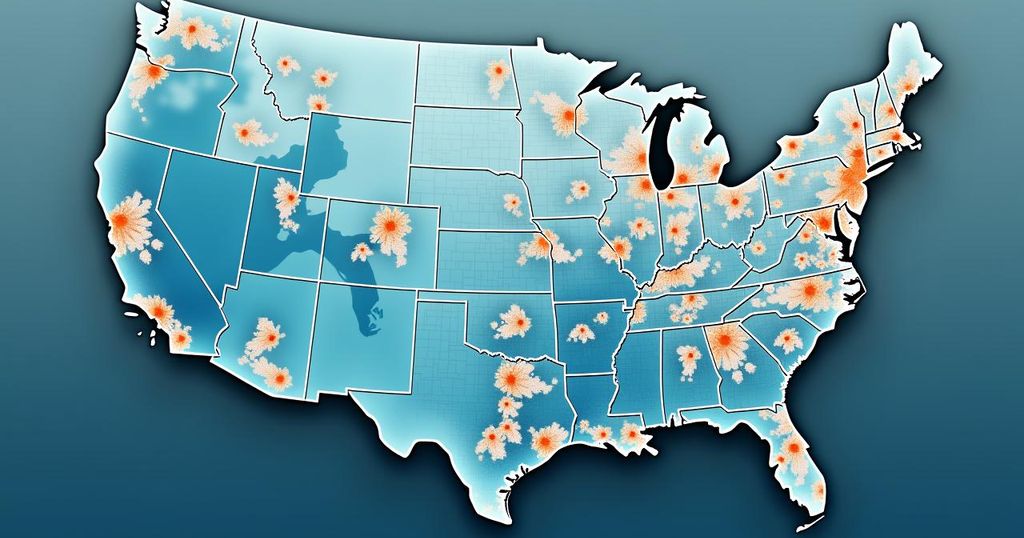Health Risks and Recovery Challenges Following Hurricane Helene

Hurricane Helene has left thousands without access to clean water and power across the Southeastern U.S., prompting health concerns regarding contamination and the potential for disease outbreaks. Health officials warn that the risks of exposure to polluted floodwaters pose significant dangers, particularly for vulnerable individuals. Recovery efforts are underway, but communities may face an extended period before restoring normalcy.
One week after Hurricane Helene struck Florida, the affected Southeastern states are beginning to recover, yet thousands remain without power or access to clean water. Health officials have raised serious concerns regarding contaminated water and mold exposure, which pose significant health risks for residents returning to their homes. The storm has resulted in confirmed storm-related fatalities exceeding 180, with ongoing searches for missing individuals. Health departments are grappling with the aftermath, particularly in Western North Carolina, where approximately 160 boil water advisories remain in effect. Additionally, 27 water plants are closed due to storm damage, leaving Asheville’s nearly 100,000 residents without a reliable clean water supply for potentially weeks. Similar advisories are present in Florida, Georgia, Tennessee, and Virginia, indicating a widespread issue. Disaster epidemiologist, Jennifer Horney, emphasizes the critical importance of access to safe water post-flood, stating, “Access to clean water is one of the most urgent health concerns after a flood. People need water for drinking, preparing food, cleaning, bathing, even flushing toilets. Contact with contaminated water can cause serious illnesses.” Individuals exposed to flood waters containing sewage face risks of infectious diseases, particularly vulnerable populations such as those with pre-existing health conditions. Symptoms may range from gastrointestinal distress to severe headaches, underscoring the potential danger of waterborne pathogens. Furthermore, hazards such as dehydration, gastrointestinal illness, and carbon monoxide poisoning from generator misuse have also been reported. As Hurricane Helene made landfall as a Category 4 storm, it left a devastating impact across Florida, South Carolina, North Carolina, Tennessee, Virginia, and Georgia, exacerbated by climate change factors. Federal aid has been dispatched to the affected areas, with President Biden and Vice President Harris visiting impacted communities to assess damage and provide support. Long-term recovery efforts are anticipated, as experts warn that the regions will require extended assistance in rebuilding and regaining normalcy. In summary, the aftermath of Hurricane Helene presents significant public health challenges, particularly concerning access to clean water and the control of potential waterborne diseases. Coordinated federal and state recovery efforts will be crucial in addressing the immediate and long-term needs of the stricken communities.
In recent years, the frequency and intensity of hurricanes have increased, with climate change cited as a contributing factor. The aftermath of such natural disasters often includes widespread destruction of infrastructure, leaving thousands without essential resources such as clean water and electricity. Health officials are particularly concerned about the risks posed by contaminated water, especially after flooding events that disturb sewage systems and water treatment facilities. Studies have suggested that these health risks can disproportionately affect vulnerable populations, necessitating urgent measures from local and federal authorities to safeguard public health and ensure the equity of recovery efforts.
The destruction wrought by Hurricane Helene underscores the pressing need for effective disaster preparedness and response measures. With thousands currently lacking access to clean water, it is imperative for health departments and governmental agencies to prioritize public safety and health. As recovery efforts continue, the importance of addressing both immediate health risks and the long-term needs of affected communities will be essential in rebuilding resilient systems that can withstand future challenges.
Original Source: www.axios.com






